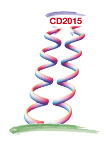Speaker
Betzalel Bazak
(Racah Institute of Physics, The Hebrew University of Jerusalem)
Description
Recently, Tan suggested that the properties of universal quantum gases depend on a new characteristic quantity, called the contact. The contact describes the probability of two particles coming close to each other, i.e. it is a measure of the number of close particle pairs in the system. Utilizing the contact, this theory predicts the energy, pressure and other properties of the system. It was proven right in a series of ultracold atomic experiments. We generalize Tan's contact to nuclear systems, introducing the various nuclear contacts, taking into account all possible pair configurations. The leading neutron-proton contact is then evaluated from medium energy photodisintegration experiments. To this end, the Levinger quasi-deuteron model of nuclear photodisintegration is reformulated, and the bridge between the Levinger constant and the contact is established. Using experimental evaluations of Levinger's constant the value of the neutron-proton contact in finite nuclei and in symmetric nuclear matter is extracted, and compared to the universal theory. Utilizing the contact, a new asymptotic connection between the one-nucleon and two-nucleon momentum distributions, describing the two-body short-range correlations in nuclei, is obtained. Using available numerical data, we extract few connections between the different contacts and verify their relations to the momentum distributions.
Author
Betzalel Bazak
(Racah Institute of Physics, The Hebrew University of Jerusalem)
Co-authors
Prof.
Nir Barnea
(Racah institute of Physics, The Hebrew University)
Mr
Ronen Weiss
(Racah institute of Physics, The Hebrew University)

